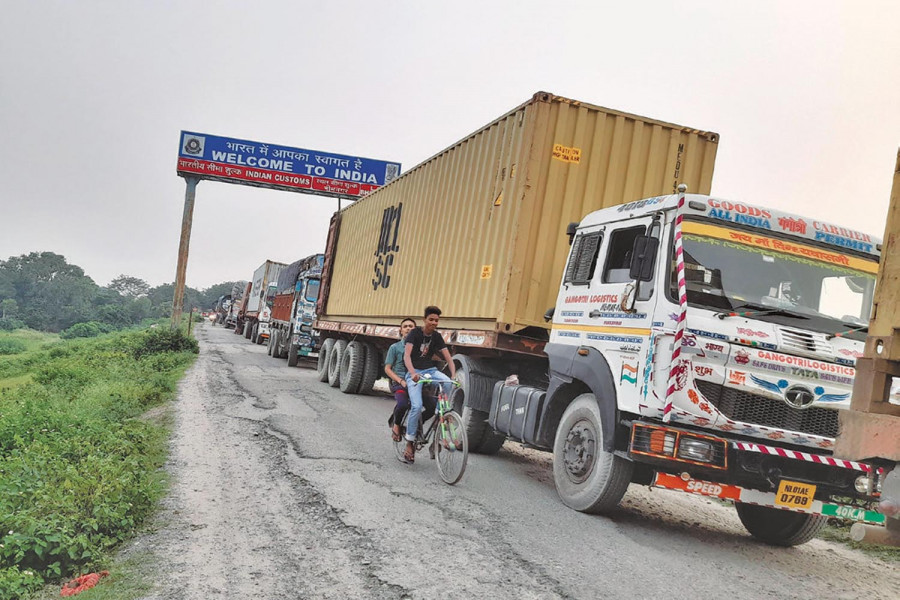
The government on Tuesday decided to lift the seven-month-old ban on the import of “luxury goods” to meet a condition of the International Monetary Fund (IMF) ahead of the formation of a new government.
The Cabinet meeting on Tuesday decided to completely lift the ban from December 16, a minister told the Post. “The cabinet meeting has in principle approved the lifting of the restrictions.”
Earlier in April, alarmed by the fast pace at which Nepal's foreign currency reserve was going down, the government imposed import restrictions besides ordering importers to maintain a 100 percent margin amount to open a letter of credit.
The directive issued on April 26 embargoed 10 types of goods described as luxury items. They included, among other things, mobile sets worth over $600 and motorcycles of over 250cc capacity. Harsher restrictions followed, and mobile sets costing more than $300 and motorcycles with a capacity of more than 150cc were banned.
On August 30, the government loosened the restrictions and permitted the import of diamonds, large television sets, toys, cards, snacks and tobacco.
The ban on automobiles, mobile phones, liquor and heavy motorcycles had been extended until December 15.
Finance Ministry officials, however, had told the Post earlier that the ban may be relaxed before the extended mid-December deadline.
While the International Monetary Fund (IMF) had questioned the wisdom behind lengthening the import ban on certain products as it was hurting trade and the economy, economists too have been saying that prolonging trade restrictions goes against the principles of a free market economy.
The Washington-based organisation had delayed the second instalment of a $400 million loan to Nepal till February 2023, stating that the country had not fulfilled the conditions. Nepal has already received $110 million as the first instalment.
Following the Russia-Ukraine war that choked the global supply system causing prices to rise like never before, Nepal too suffered chronic current account deficits and was increasingly vulnerable to external economic shocks with accelerating foreign reserve depletion.
The situation has since improved.
With a mission to promote global economic growth and financial stability and encourage international trade, the IMF had lauded the initiatives taken by the government to address the decreasing foreign exchange reserves, but it had expressed concern over the ban on imports.
An IMF team led by Robert Gregory had visited Kathmandu from April 24 to May 2 to discuss the first review under Nepal’s extended credit facility (ECF). The ECF provides financial assistance to countries with protracted balance of payments problems.
Automobile dealers have been constantly saying that the import ban was choking their business.
“More than 75 car showrooms have shut down. Another 70 are on the verge of closing,” Dhruba Thapa, president of the Nepal Automobile Dealers Association, told the Post in a recent interview.
In January, the IMF approved a $395.9 million extended credit facility for Nepal.
The 38-month financing package was provided to Nepal to mitigate the Covid pandemic’s impact on health and economic activity, protect vulnerable groups, preserve macroeconomic and financial stability, and support sustained growth and poverty reduction.
As per the agreement, the IMF will provide around $55 million in the second disbursement.
The Covid pandemic took a heavy toll on Nepal’s economy. From April to July 2021, Nepal suffered a devastating second wave of Covid, interrupting a gradual recovery in economic activities.
Nepal’s economy contracted by 2.1 percent in 2019-20. The IMF estimated a partial recovery of growth at 2.7 percent for 2020-21 and forecast growth of 4.4 percent in 2021-22.
The collapse of tourism and service sectors, which are key drivers for growth, will take time to recover, the IMF said. After a sharp drop in 2020, imports have rapidly grown, fuelling a large current account deficit.
According to the Nepal Rastra Bank, the country's foreign exchange reserves are now sufficient to cover goods imports for 9.6 months, and goods and services imports for 8.3 months.
The balance of payments remained at a surplus of Rs12.43 billion, and gross foreign exchange reserves stood at $9.48 billion in the first quarter of the fiscal year that ended mid-October, the central bank said.












